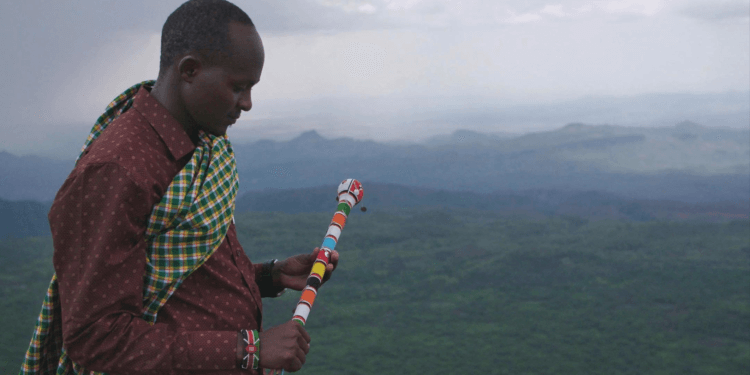As an art form, documentaries are often a tricky subject for me. They promise to capture the truth of real life over extended periods, yet through editing and sequencing, that reality may sometimes end up as a subjective narrative that is either squeezed from hard stone or one that simply comes to the surface effortlessly. This cloudy veil always leaves me questioning just how much the presence of the cameras changed the reality at play and what the countless omitted scenes would have said louder. However, with The Battle for Laikipia, I rarely had that feeling.
This Kenyan documentary, which premiered at Sundance earlier this year and is currently screening at NBO Film Festival, is directed by Peter Murimi (I Am Samuel) and Daphne Matziaraki who also co-produces alongside Toni Kamau (Softie). It explores the ongoing conflict between Samburu pastoralists and white ranchers in Laikipia.
Beginning with a brief and storied history that befell the lands of Laikipia through the colonial period to the present day, The Battle for Laikipia then becomes a nuanced portrait of the present personifications of that land. Poignant and uncompromising, the narrative bounces back and forth through the eyes of generations of bottled-up resentments that sometimes sip through shared broken Swahili and the subtle threats of neighbours. The film neither spares the blemishes nor humanity of either side, hovering at the back as simply a conveyor of the uncensored thoughts that slip through routine.
On the one side, squeezed out of their ancestral lands by electric fences and an ever-progressive drought – the stark realities of a worsening climate change crisis – the pastoralists are forced to call the bluffs of their white neighbours to feed their starving livestock. On the other side, the grandchildren and great-grandchildren of white settlers desperately try to hold their line spread out across acres for the only sense of life they have ever known.
Aptly titled, The Battle for Laikipia feels unobtrusive in its depiction of this conflict. The emotions it amplifies—helplessness, resilience, and a deep sense of purpose in defending one’s way of life—come through unfiltered. Both sides of this war feel they are right, as voiced in their introspective opinions, and both sides have their moments of love, grief, fear, and moral incapacity. That guided needle of perspicacity in the middle of the conflict is a hard one to balance, and the film takes a while to find it, but when it does, it rarely lets go of it. From conversations laced with veiled threats and curses exchanged behind polite smiles to the hopeless optimism of a suffering family sharing a cup of tea. From workshops that debate with the same colonial inferences on how to deal with pastoralists to the loud irresponsibility of government officials in this conflict, The Battle for Laikipia contrasts the differing worlds as conclusively as one would fiction.
The cinematography is muted but distinct, and the editing is spectacular in the building up of the worlds and emotions on both sides. With Matziaraki and Murimi’s direction, the documentary which was filmed over five years, takes the audience through a very extended period with minimal but impactful scenes. It lingers through the good and the bad yet rarely takes itself into the actual battles, choosing instead to offer a look into the people behind the headlines, both before and after their wars.
Yet even with this intentional objectivity, what makes The Battle for Laikipia stand tall is how easily the subjectivity of its narrative comes out. Regardless of who’s watching it, the film is clear where its sympathies lie. Though it spends a lot of time with the white settlers, softly building their case on the legality of their place in the community and their right to the land, their compassion and duty to one another, and more importantly, the role they are playing to conserve the last of breeds of wildlife quickly coming to extinction, the more the camera stays on them, the more it reveals a lot of wincing cracks. The manner of their interactions with the more comprehensible pastoralists could be easily mistaken for an actual colonial figurehead, made worse by the pride they take in speaking the local language.
With the climate change crisis worsening, The Battle for Laikipia is simply a preamble of a conflict with no concrete resolution at hand. The film offers no answers, bidding instead on the emotions it is sure will pulsate on whoever watches it, and hopefully, those emotions will be strong enough to stir the change that is needed.
All in all, gorgeous and understated, what makes The Battle for Laikipia so unique in style and tone might as well be its most detrimental aspect. The film’s lack of focus on a digestible reality can be frustrating at times, but it ultimately delivers with certainty that, no matter which scenes made it into the final cut after years of filming, they would all convey the same message: the retaliatory conversations—from settlers, pastoralists, and politicians alike, whether morally justified or not—are overshadowing the more productive discussions needed to resolve the conflict.
The Battle for Laikipia is currently screening at the NBO Film Festival.











